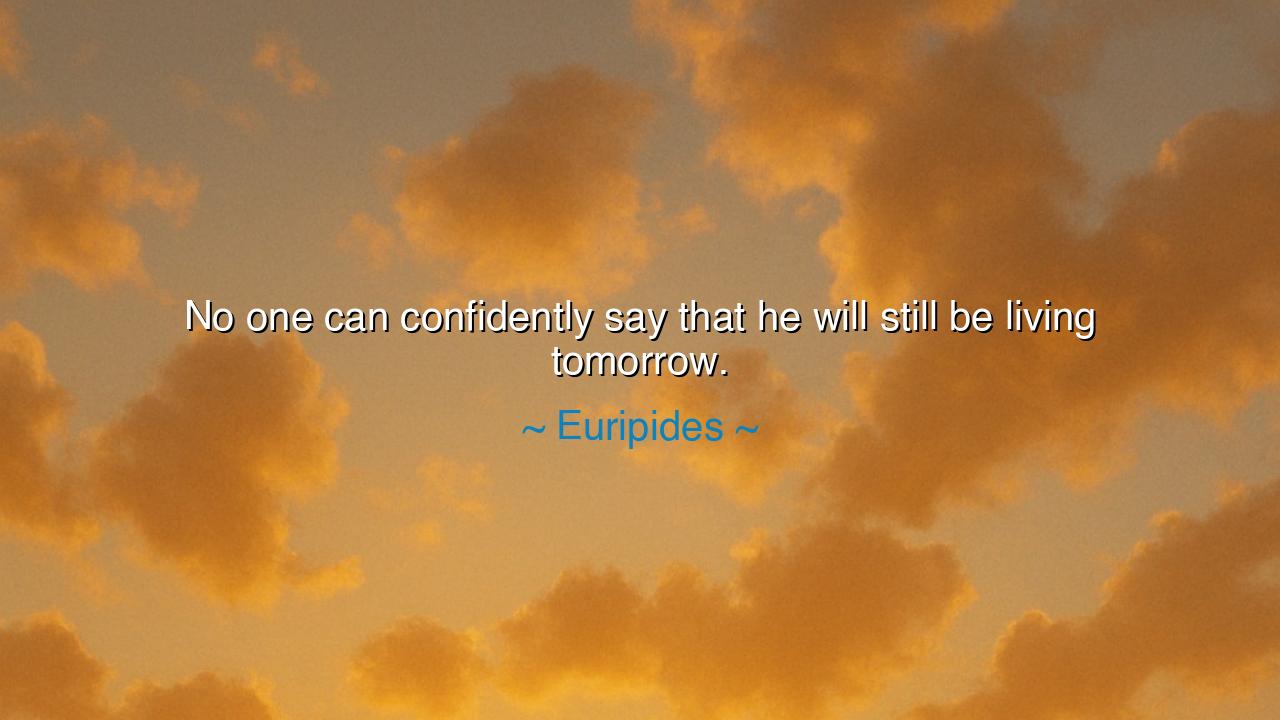
No one can confidently say that he will still be living tomorrow.






The ancient tragedian Euripides, whose words still echo through the corridors of time, once wrote: “No one can confidently say that he will still be living tomorrow.” These are not the words of despair, but of truth—truth spoken from the depths of human understanding. In this simple yet profound statement lies the eternal reminder of life’s fragility, the fleeting nature of our days, and the urgent call to live with humility, gratitude, and courage. For all the power of men—all their wealth, wisdom, and glory—none can command another dawn. Death, that silent and impartial sovereign, walks always beside us, unseen yet near.
Euripides lived in an age when the gods were believed to govern the fates of mortals. Yet even beyond divine myth, his words reach toward a universal wisdom: that mortality is the great equalizer, the thread that binds all human beings together. No emperor, no warrior, no poet can guarantee that the breath they draw today will still be with them tomorrow. The moment one realizes this truth, pride gives way to reverence. Life ceases to be a possession to be hoarded and becomes instead a miracle to be cherished. The ancient Greeks called this awareness sophrosyne—a deep sense of balance born from recognizing one’s limits before the vastness of fate.
The origin of this quote lies in the tragedies of Euripides, where he often explored the fragile boundary between life and death, hope and despair. His plays, like Alcestis and The Trojan Women, were mirrors held up to humanity’s suffering and endurance. He saw how swiftly the tides of fortune turned—how kings fell in a night, how heroes met their end at the height of triumph. His words were not meant to frighten, but to awaken: to remind the living that every sunrise is a gift, and every moment an opportunity to act justly, love deeply, and live wisely. To believe one is secure in life is to be deceived; to know that tomorrow is uncertain is to live truthfully.
Consider the story of Alexander the Great, whose name once shook the world. At thirty-two, he had conquered empires and stood upon the edge of the known earth. Yet when he lay dying, his hands were left open outside his coffin, by his own command, to show that even he—conqueror of nations—could take nothing with him beyond the grave. He could not confidently say that he would live tomorrow, for the mightiest among men falls before time as easily as the frailest. And in that realization lies the essence of Euripides’ wisdom: death is not the enemy, but the teacher, reminding us to live each day as if it were the last, and to meet it with clarity, grace, and purpose.
To live with this awareness is not to cower before the unknown, but to awaken fully to life. The one who accepts mortality does not waste his hours in vanity or hatred; he spends them in meaning. He forgives sooner, loves stronger, listens deeper. The fear of death diminishes when one begins to live rightly, for the just soul has already made peace with the inevitable. The ancients taught that courage is not found in denying death, but in walking beside it without trembling. He who knows he might not see another dawn becomes gentle with others, diligent in work, and rich in heart.
Euripides’ words also carry a quiet challenge: do not delay your goodness. Many live as if there will always be time—time to mend a broken relationship, time to follow a dream, time to speak truth or offer kindness. But tomorrow is a fragile promise, and life has never sworn an oath to keep it. Thus, the wise do not postpone virtue. They act today, they love today, they forgive today. To live each day as though tomorrow is uncertain is not despair—it is wisdom in its purest form.
So, my child, remember this teaching: no one can confidently say that he will still be living tomorrow, but all can live honorably today. Wake each morning with gratitude, and close each night in peace. Speak kindly, for your words may be your last gift. Work earnestly, for your efforts may be your final offering to the world. Do not fear death; fear instead the unlived day—the day squandered in apathy or pride. For those who live fully need not cling to life; they have already tasted eternity in each moment of awareness.
In the end, Euripides’ truth is both a warning and a blessing. It humbles the proud and strengthens the wise. To know that life is uncertain is to hold it sacred. For the day may vanish like the dew upon the grass—but the soul that has loved, served, and lived with reverence leaves behind a light that even death cannot extinguish.






AAdministratorAdministrator
Welcome, honored guests. Please leave a comment, we will respond soon